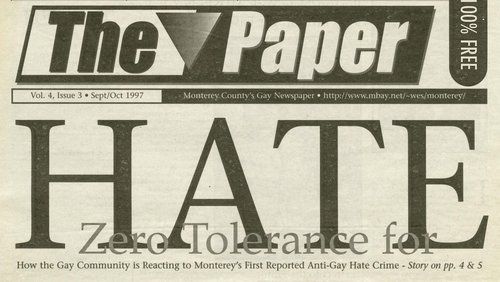Highlights from the Monterey County LGBTQ History Collection
Law and Justice
The LGBTQ+ community has long been persecuted in the court of public opinion. The community’s relationship to the legal system, especially law enforcement and the judicial system, has been particularly complex. These histories are usually recounted from the point of view of urban communities--including police raids of LGBTQ bars in the 1950s and 1960s. As the LGBTQ History of Monterey County collection suggests, other communities outside urban areas have their own stories to tell.[1]
For example, one case of gay bashing in the 1990s was extensively covered by The Paper. As the story recounted, a man was approached by two other men who asked “Hey, YOU... are you a fucking queer?” After responding yes, the man was viciously attacked and beaten unconscious, saved by two women who began screaming at the sight, as the perpetrators left the unconscious victim for dead. The victim was rushed to medical aid and after treatment was able to identify his attackers. During trial, the attackers faced a possible year long sentence.

The judge ultimately determined that the perpetrators were guilty of felony battery, but not a hate crime, sparking outrage from the LGBTQ+ community. The victim’s father also voiced his discontent with the legal proceedings. As a result, the judge publicly defended his position, stating that the assailants were already planning on attacking someone that night and their decision to assault someone was not dependent on their sexual orientation. He stated “They could have asked if he was Italian, a Jew, or a Dallas Cowboy fan," insinuating that the attack was not preventable and the question they asked had little to do with whether they would have attacked or not.“ [2].
Such histories are important to understand more current events. For example, when local police officers wanted to march in the 2018 Pride Parade, the Monterey Peninsula Pride board voted that police would not be allowed to march in uniform given the challenging relationship historically with law enforcement. Having the LGBTQ History of Monterey County collection available to all makes it possible to access materials which can provide a more nuanced context for understanding such complex issues and LGBTQ+ community/police relationships.[3].
Image source: The Paper, Vol 4, Issue 3, September/October 1997, Monterey County LGBTQ History Collection, California State University, Monterey Bay Archives and Special Collections
References
[1] Joey L. Mogul, Andrea J. Ritchie, and Kay Whitlock, Queer (In)Justice: The Criminalization of LGBT People in the United States (Boston: Beacon Press, 2011).
[2] “Gay Bashing Victim’s Statement,” The Paper (Monterey County), Volume 5, Number 1, May/June 1998; "Death Threats Follow Local Man After Bashing," The Paper (Monterey County), Volume 4, Number 3, September/October 1997. Monterey County LGBTQ History Collection, California State University, Monterey Bay Archives and Special Collections
[3] James Herrera, "Monterey Peninsula Pride to Address Relationship with Local Law Enforcement," Monterey Herald, March 27, 2019. Accessed May 07, 2019.
